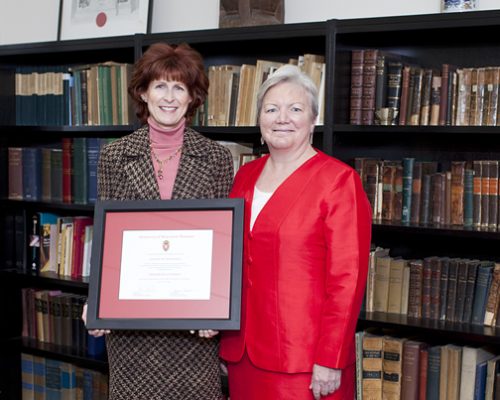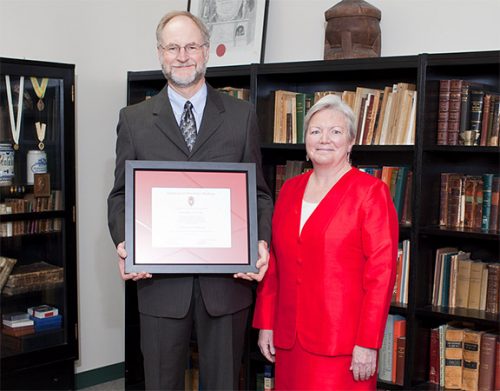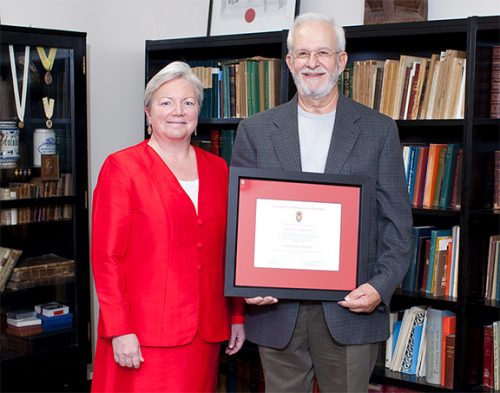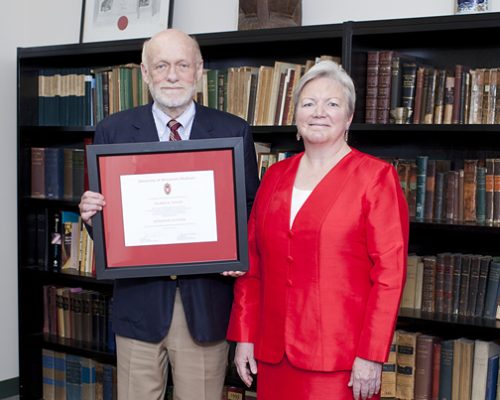Lynnae Mahaney
Citation recipient Lynnae Mahaney (left) with Dean Jeanette Roberts (right)
Lynnae Mahaney graduated from the UW–Madison School of Pharmacy with her BS in 1982 and then furthered her education at the UW–Milwaukee School of Business, earning her MBA in 1990. Lynnae started her professional career at Methodist Hospital here in Madison as a staff pharmacist. Methodist eventually became part of the Meriter Hospital organization, and Lynnae was promoted to Pharmacy Supervisor in 1986 and to Manager of Operations in 1988. In 1991, Lynnae became the Director of Pharmacy at Bellin Hospital in Green Bay and subsequently joined the University of Wisconsin Medical Foundation as Director of Pharmacy of their six retail pharmacies. In 1999, Lynnae became the Chief of Pharmacy Service at the William S. Middleton Memorial Veterans Hospital in Madison, where she was responsible for the comprehensive pharmacy services for over 35,000 veterans, several pharmacy residency programs, and what must be thousands of UW student pharmacists on rotation there.
A couple years ago, Lynnae took on the position of Vice President for Hospital and Health Systems Services for Visante, Inc., a Minneapolis-based company founded by UW School of Pharmacy alum and Board of Visitors chair, Mike Flagstad. Much of her expertise involves practice model changes in both clinic and hospital settings, and she has gained a national and international reputation for the advancement and evolution of pharmacist roles and responsibilities. She continues to pursue her interest in global healthcare issues through the expansion of Visante’s International Practice. She also continues to serve the VA pharmacy community as Program Manager.
Lynnae has always been active in professional pharmacy organizations. Locally, she participated extensively in the Wisconsin Society of Health System Pharmacists and received their President’s Award in 1995. After creation of the Pharmacy Society of Wisconsin, Lynnae served on the Board of Directors and received PSW’s Pharmacist of the Year Award in 2004. Nationally, she has participated in a wide variety of activities and as a member several committees and councils for the American Society of Health-System Pharmacists and was elected an ASHP Fellow in 2000. She has served on the Board of Directors since 2004. In 2010, Lynnae was elected President of ASHP and brought her voice and influence to that position with her usual vision and enthusiasm. In 2011, she was installed as the Board Chair of ASHP’s Research and Education Foundation.
Rick Pyter
Citation recipient Rick Pyter (left) with Dean Jeanette Roberts (right)
Dr. Richard “Rick” Pyter received his BS degree in Pharmacy in 1973 and completed his required 1-year internship at St. Luke’s Hospital in Milwaukee, becoming a licensed pharmacist in 1974. However, during Rick’s last 2 years at the school, the research bug bit him while doing experiments on the levels of PCBs, DDT, and other pesticides found in water, sediment, and fish, while working part-time in the Water Chemistry Department. An interest in research resulted from his inherent sense of curiosity about how things work and a strong desire to be “state of the art” on the physical science principles important to the students and practitioners of pharmacy. Shortly after receiving his pharmacy license, Rick returned to the school to begin work on his MS then PhD degrees in Pharmaceutics based on his research related to solubilization and wetting of solid surfaces…an area of critical importance in the pharmaceutical industry.
In 1980, Rick was recruited to Abbott Laboratories by UW alum Jim Tingstad as a pharmaceutical research scientist and rapidly progressed into various leadership and administrative responsibilities for most, if not all, of the scientific, manufacturing, and regulatory aspects of dosage form design and commercialization. His experiences ranged from working at the drug discovery/development interface, development of a variety of dosage forms for new and existing drugs, through providing technical support to the plants that manufactured the products that he and his colleagues designed. During a period of almost 30 years at Abbott, he received three prestigious Abbott Achievement Awards and three Executive Vice President Achievement Awards for his innovative leadership in bringing important Abbott products to the market. In more recent years, he played a very important role in strategic planning at the global level.
Since his retirement from Abbott in 2007, Rick has been actively engaged as a consultant to the pharmaceutical industry on many technical and administrative issues, drawing on his vast experiences in the drug development process.
Throughout his career, Rick has shown a very natural interest in and affinity for teaching at various levels, “scratching a teaching itch” as he puts it. At Abbott, he was well recognized for taking a great interest in mentoring young scientists. On a more formal basis, Rick has held the position of Adjunct Professor of Pharmaceutical Sciences at the school for well over 25 years, coming to Madison regularly to give lectures in the Drug Delivery course for professional students and interacting with graduate students and faculty in Pharmaceutics and Drug Delivery. Over the years, more than a handful of our best graduates were enticed to work within the Product Development arena at Abbott, so a very mutually beneficial relationship indeed.
One of Rick’s most important contributions to the School of Pharmacy has been his active participation in the establishment and organization of the Zeeh Pharmaceutical Experiment Station. He was a key consultant at the time that the idea of re-establishing the Station was initiated and has served on the Scientific Advisory Board since its inception. He was the Board Chair from 2006 to 2009 at a critical period in the Station’s development and growth. He also played a leadership role in the development of short courses for pharmaceutical scientists cooperatively offered by the Station and our Extension Services in Pharmacy Division and continues to serve as a member of the faculty for those courses. Rick has also served a very important role on the school’s Board of Visitors.
John Rosazza
Citation recipient John Rosazza (left) with Dean Jeanette Roberts (right)
Dr. John “Jack” Rosazza received his BS in Pharmacy, his MS in fermentation and pharmacognosy, and his PhD in synthetic organic chemistry – all from the University of Connecticut. At UConn, he was an NIH Trainee in the first National Products Training program in the United States. At an annual seminar that brought the best scientists in the world to UConn to speak, Jack met Professor Charlie Sih from our faculty and was impressed with and excited about Charlie’s work. This admiration led Jack and his family to Madison in 1968 for a position as a postdoctoral fellow in Professor Sih’s lab. He was involved in the microbial synthesis of L-dopa, then a newly found and scarce drug for the treatment of Parkinson’s disease.
After his UW experience, Jack accepted an assistant faculty position in Medicinal and Natural Products Chemistry at the University of Iowa College of Pharmacy. He was promoted to associate professor and then to full professor in 1977, serving as the head of the department for 18 years. He served as a mentor and advisor to 30 PhD students and 32 postdoctoral and visiting scholars. He and his research group published more than 220 papers and patents during his career. His research encompassed biocatalysis in organic chemistry, developing the concept of microbial models for xenobiotic metabolism, natural products chemistry and biochemistry, and nitric oxide synthase in bacteria.
Jack was the founder of the multi-departmental Biocatalysis Research Group at Iowa in 1983, an organization that grew to include some 60 faculty members from 8 departments. The group evolved into the Center for Biocatalysis and Bioprocessing – the first such center in the world, with Jack as the first director. He has also served widely as a consultant to the National Cancer Institute, numerous pharmaceutical and chemical industries and was a member of nine editorial boards.
Palmer Taylor
Citation recipient Palmer Taylor (left) with Dean Jeanette Roberts (right)
Dr. Palmer Taylor is a graduate of the University of Wisconsin–Madison School of Pharmacy, earning his BS in Pharmacy in 1960 and his PhD in Physical Pharmacy in 1964. After graduation, he gained additional experience as a research associate in the pharmacology-toxicology associate program. From 1968 to 1970, Palmer completed an NIH Fellowship with the Medical Research Council in Cambridge, England, in the Molecular Pharmacology Unit. After a stop at the Max Planck Institute for Physical Chemistry in Germany, he joined the faculty at the University of California-San Diego, initially as an assistant professor, rising to Professor and Founding Chair of the Department of Pharmacology there. Since 1994, Palmer has held the titles of Professor and Sandra and Monroe Trout Chair of Pharmacology. He has served as Dean of the Skaggs School of Pharmacy and Pharmaceutical Sciences since 2002 as well as the Associate Vice Chancellor for Health Sciences.
Palmer has a long-standing interest in neuropharmacology, especially the proteins governing neurotransmission in cholinergic synapses. He and his colleagues worked extensively on the structure and function of the enzyme, acetylcholinesterase, and its inhibitors and reactivators for over three decades. His efforts have entailed characterizing the enzyme forms, cloning its complementary DNA and genomic DNA, examining expression and splicing, analyzing structure by physical and crystallographic methods, and characterizing inhibition and reactivation kinetics. His work provided the basis for studies with Barry Sharpless’ group at the Scripps Research Institute employing freeze-frame, click-chemistry that we had the opportunity to hear about in a seminar earlier this afternoon. Palmer’s research group also uncovered much of what is known about the structure of neuroligin, a synaptic adhesion molecule homologous to acetylcholinesterase, and its binding partner neurexin. Their structural studies have delineated alterations in processing and folding associated with congenital mutations found in the autism spectrum disorders. These pathways suggest potential therapeutic modalities for this very difficult developmental condition.
Palmer has published some 240 peer-reviewed papers on these topics and has also served as associate editor of Molecular Pharmacology, co-author and co-editor of Goodman and Gilman’s Pharmacological Basis of Therapeutics, and has served on the editorial board of several pharmaceutical journals. He also served on NIH National Advisory Councils for both the National Institute of General Medical Sciences and the National Institute of Environmental Health Sciences. He has always been active in national scientific organizations and was elected President of the American Society for Pharmacology and Experimental Therapeutics in 1995.





